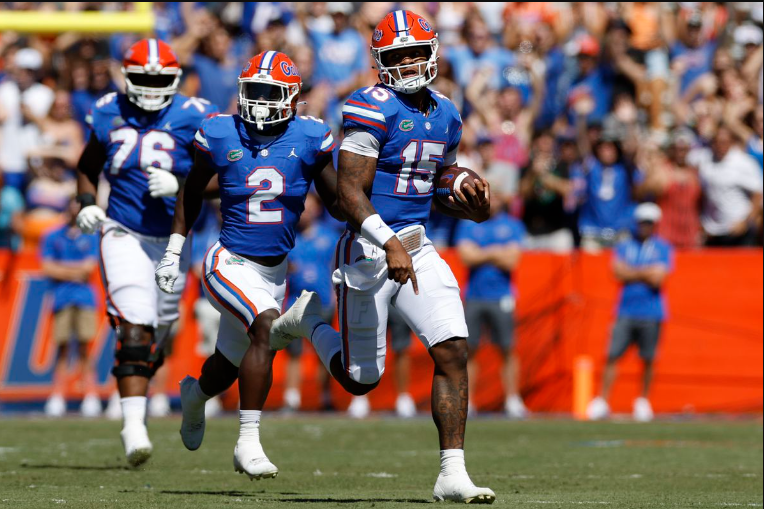
Pass protection from Jadan Baugh a departure from a former Florida Football RB

When Trevor Etienne announced his decision to transfer from Florida Football, it sparked a mix of reactions among fans and analysts. A prevailing narrative emerged that he struggled significantly in pass protection, a claim that seemed to arise more from disappointment than objective evaluation during his time with the Gators. However, a deeper dive into the data surrounding his performance reveals a more complex picture. While some fans may have overlooked the importance of this aspect of his game during his tenure, the numbers tell a compelling story about his challenges in this area. In contrast, Florida’s current backup running back, Jadan Baugh, is making waves with his willingness and effectiveness in pass protection, illustrating a noticeable shift in the running back’s responsibilities.
Last season, the numbers indicated that Etienne faced considerable difficulties in protecting the quarterback. Among the 266 running backs who were credited with at least 50 blocking snaps, he ranked poorly, giving up the 27th most pressures. This statistic places him among a concerning group; only 34 running backs surrendered more than one sack during the season. Pro Football Focus even graded him as the 24th worst pass-blocking running back in the country in 2023. This statistical evidence adds a layer of credibility to the criticisms that emerged following his departure. For a program aiming for excellence, having a running back who is a liability in pass protection is a significant concern.
In the wake of Etienne’s exit, Florida has rotated several players behind Montrell Johnson, the starting running back. The situation was further complicated when Treyaun Webb suffered an injury before the UCF game, leading to increased opportunities for Jadan Baugh. While Baugh had already begun to gain attention for his aggressive running style, it was his pass-blocking skills that truly set him apart during this particular game, showcasing a willingness to step up in an area where Etienne had faltered.
Head coach Billy Napier acknowledged Baugh’s performance in his post-game remarks. He emphasized the importance of pass protection for young backs, noting that their ability to protect the quarterback directly impacts their playing time. Baugh’s contributions were especially crucial against UCF, where the Gators faced a significant challenge in dealing with internal pressures from the Knights’ defense. Napier highlighted specific moments where Baugh’s blocking helped secure key third-down conversions, noting one instance in particular where he effectively handled a double A-gap cross pressure, allowing quarterback Graham Mertz to find receiver Tank Bigsby for a vital completion.
In terms of statistics, Baugh officially logged two pass blocks in the game, both of which were successful and did not result in any pressures on the quarterback. This stands in stark contrast to UCF’s running back RJ Harvey, who experienced difficulties of his own, allowing three pressures, including two hurries and a sack, the latter of which occurred due to a missed assignment on a critical play. Baugh’s performance not only reflects his readiness to embrace his responsibilities but also highlights a potentially transformative shift in the running back position for Florida Football.
As the season progresses and Treyaun Webb returns to health, the question arises about how Baugh’s role will evolve. His ability to pick up blitzes and protect the quarterback will undoubtedly influence his playing time. If he continues to demonstrate the same level of effectiveness and willingness to engage in pass protection, it is conceivable that he could carve out a more significant role in the offense. Baugh’s emergence as a reliable pass protector may not only bolster his standing with the coaching staff but also provide much-needed stability to a position that has faced scrutiny.
The transition from one running back to another—especially one like Etienne, who had a mix of talents but struggled in critical areas—highlights the importance of adaptability within the program. Florida’s offensive strategy demands versatility from its running backs, requiring them to excel in various roles beyond just carrying the football. Pass protection is a critical component of this, as it ensures that quarterbacks have the time they need to make plays downfield. Baugh’s performance illustrates a commitment to meeting those demands head-on.
Moreover, the broader implications of Baugh’s performance extend beyond individual statistics. A running back who is proficient in pass protection not only enhances the offense’s efficiency but also boosts the confidence of the quarterback. Knowing that a reliable blocker is available to assist in protecting against the blitz can change the dynamics of how a quarterback approaches the game. It allows for a greater variety of plays to be called, knowing that the quarterback can stand firm in the pocket to execute them.
Baugh’s contributions also underscore the ongoing evolution of the running back position within college football. As the game continues to emphasize passing and offensive schemes that rely heavily on the quarterback, the importance of being a multifaceted player becomes increasingly apparent. Running backs are no longer just ball-carriers; they are integral components of the offensive line’s protection scheme and playmakers in their own right.
The contrast between Baugh and Etienne serves as a reminder of the nuances involved in evaluating player performance. While Etienne may have had moments of brilliance, his overall effectiveness was hindered by his struggles in pass protection. On the other hand, Baugh’s readiness to step up in this critical area could play a significant role in Florida’s offensive success moving forward.
However, Jadan Baugh’s performance as a pass protector represents a critical departure from the narrative surrounding Trevor Etienne’s time at Florida Football. While the statistics may have cast a shadow over Etienne’s contributions, they also illuminate the potential for growth and improvement within the program. Baugh’s hard-running style, combined with his willingness and effectiveness in pass protection, offers a fresh perspective on the running back position and its evolving role in the modern game. As the season progresses, all eyes will be on Baugh to see if he can maintain his trajectory and help elevate the Gators to new heights, both in terms of performance and overall team success. The development of young players like Baugh will be essential for Florida as they aim to reclaim their status among the elite teams in college football.

Leave a Reply